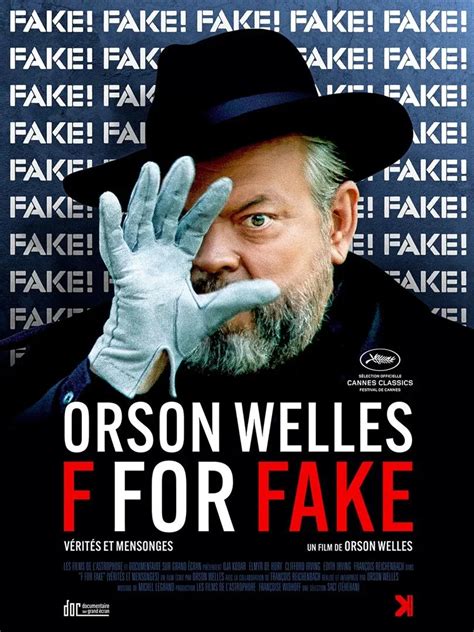F for Fake

Description:
F for Fake is Orson Welles’s playful, metafictional documentary on truth, illusion, and authorship. It follows art forger Elmyr de Hory and biographer Clifford Irving as their celebrated hoaxes are examined, while Welles interjects with sly narration and humor. Blending documentary with performance, the film probes how stories are manufactured, contested, and believed, inviting viewers to question certainty in cinema.Keywords:
Documentary, Experimental, Biographical, Meta Documentary, HoaxIs F for fake a documentary?
Yes, "F for Fake" is a documentary film directed by Orson Welles, released in 1973. The film explores themes of authenticity, deception, and the nature of art, focusing on art forgers like Elmyr de Hory and the famous literary hoaxer Clifford Irving. Welles blends documentary with narrative elements, employing a playful and innovative style that challenges viewers’ perceptions of truth and fiction. The film is notable for its experimental approach and is considered a significant work in the documentary genre.
What is f is for fake about?
"F for Fake" is a 1973 film directed by Orson Welles that explores themes of art, authenticity, and deception. The documentary-style film examines the world of art forgery, focusing on the notorious forger Elmyr de Hory, as well as the life of Welles and his own experiences with illusion. Through a blend of storytelling, interviews, and inventive editing, Welles challenges the viewer's perceptions of reality and truth in art, ultimately questioning the nature of authenticity itself. The film is celebrated for its innovative structure and playful narrative.
Is "F for Fake" worth watching?
"F for Fake," directed by Orson Welles, is a unique and innovative film that explores themes of art, authenticity, and deception. Released in 1973, it blends documentary and narrative styles, offering a fascinating look at art forgeries and the nature of illusion. Welles' playful storytelling and visual techniques make it engaging and thought-provoking. If you appreciate experimental cinema or are interested in art and philosophy, it's definitely worth watching for its originality and insight.
What is Orson Welles best known for?
Orson Welles is best known for his groundbreaking work in film and theater, particularly for his directorial debut, "Citizen Kane" (1941), which is often regarded as one of the greatest films of all time. Welles was a pioneer in narrative structure and cinematography, and he also gained acclaim for his voice and performances in various roles. In "F for Fake" (1973), Welles explores themes of deception and authenticity in art, showcasing his unique storytelling style and reflective commentary on the nature of truth in filmmaking.
Explore More Categories: